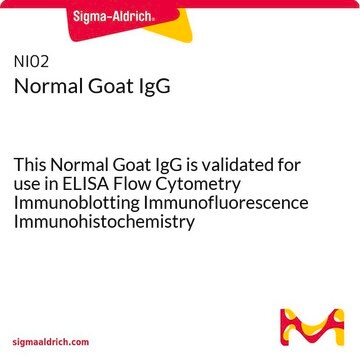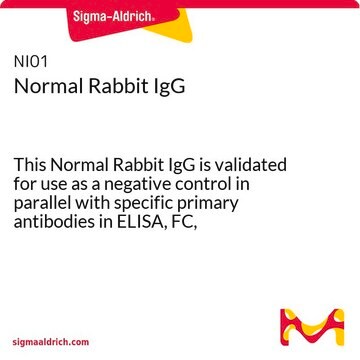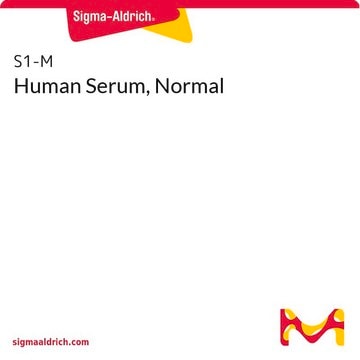AC146
Normal Chicken IgY Antibody, purified | AC146
1 mg/mL, Chemicon®
Sign Into View Organizational & Contract Pricing
All Photos(2)
About This Item
UNSPSC Code:
12352203
eCl@ss:
32160702
NACRES:
NA.41
Recommended Products
biological source
chicken
Quality Level
antibody form
purified antibody
clone
polyclonal
manufacturer/tradename
Chemicon®
concentration
1 mg/mL
technique(s)
blocking: suitable (interfering antibodies)
isotype
IgY
shipped in
wet ice
target post-translational modification
unmodified
General description
Chickens transfer high quantities of IgY (IgG) into the egg yolk and harvesting antibodies from eggs eliminates the need for the invasive bleeding procedure. One week′s eggs can contain 10 times more antibodies than the volume of rabbit blood obtained from one weekly bleeding. However, there are some disadvantages when using certain chicken derived antibodies in immunoassays. Chicken IgY does not fix mammalian complement component C1 and it does not perform as a precipitating antibody using standard solutions.
Application
Gel Electrophoresis Analysis: 20 µg of reduced Chicken IgY from a representative lot was resolved by SDS-PAGE and visualized using total protein stain.
Note: To be used as a negative control for ChIP Ab+ MeCP2, Cat. No. 17-10491.
Note: For use as a negative control, perform experiments in parallel using primary antibody or normal serum at the same concentration. A signal obtained with the normal serum indicates a nonspecific interaction; any additional signal with the primary antibody indicates a specific antibody-antigen interaction.
Note: To be used as a negative control for ChIP Ab+ MeCP2, Cat. No. 17-10491.
Note: For use as a negative control, perform experiments in parallel using primary antibody or normal serum at the same concentration. A signal obtained with the normal serum indicates a nonspecific interaction; any additional signal with the primary antibody indicates a specific antibody-antigen interaction.
Research Category
Secondary & Control Antibodies
Secondary & Control Antibodies
Research Sub Category
Isotype Control Antibodies
Isotype Control Antibodies
Quality
Evaluated by Western Blotting using non-reduced Chicken IgY.
Western Blotting Analysis: 0.01 µg of this non-reduced Chicken IgY was detected by a Rabbit anti-Chicken secondary antibody.
Western Blotting Analysis: 0.01 µg of this non-reduced Chicken IgY was detected by a Rabbit anti-Chicken secondary antibody.
Target description
~180 kDa observed. Uncharacterized band(s) may be observed in some cell lysates.
Physical form
Format: Purified
Purified chicken polyclonal in buffer containing PBS with 0.05% sodium azide.
T-gel
Storage and Stability
Stable for 1 year at 2-8°C from date of receipt.
Legal Information
CHEMICON is a registered trademark of Merck KGaA, Darmstadt, Germany
Disclaimer
Unless otherwise stated in our catalog or other company documentation accompanying the product(s), our products are intended for research use only and are not to be used for any other purpose, which includes but is not limited to, unauthorized commercial uses, in vitro diagnostic uses, ex vivo or in vivo therapeutic uses or any type of consumption or application to humans or animals.
Storage Class Code
10 - Combustible liquids
WGK
WGK 2
Flash Point(F)
Not applicable
Flash Point(C)
Not applicable
Certificates of Analysis (COA)
Search for Certificates of Analysis (COA) by entering the products Lot/Batch Number. Lot and Batch Numbers can be found on a product’s label following the words ‘Lot’ or ‘Batch’.
Already Own This Product?
Find documentation for the products that you have recently purchased in the Document Library.
Nealia Cm House et al.
eLife, 8 (2019-12-06)
CAG/CTG trinuncleotide repeats are fragile sequences that when expanded form DNA secondary structures and cause human disease. We evaluated CAG/CTG repeat stability and repair outcomes in histone H2 mutants in S. cerevisiae. Although the two copies of H2A are nearly
Emile Rage et al.
Applied microbiology and biotechnology, 103(18), 7491-7504 (2019-07-25)
Infectious bursal disease virus (IBDV) is the cause of an economically important highly contagious disease of poultry, and vaccines are regarded as the most beneficial interventions for its prevention. In this study, plants were used to produce a recombinant chimeric
Tina M Kousted et al.
Heliyon, 3(3), e00267-e00267 (2017-04-04)
Hens have a tremendous capacity for producing polyclonal antibodies that can subsequently be isolated in high concentrations from their eggs. An approach for further maximizing their potential is to produce multiple antisera in the same individual through multiplexed (multiple simultaneous)
Piotr Michaluk et al.
eLife, 10 (2021-04-17)
Glutamate uptake by astroglial transporters confines excitatory transmission to the synaptic cleft. The efficiency of this mechanism depends on the transporter dynamics in the astrocyte membrane, which remains poorly understood. Here, we visualise the main glial glutamate transporter GLT1 by
Our team of scientists has experience in all areas of research including Life Science, Material Science, Chemical Synthesis, Chromatography, Analytical and many others.
Contact Technical Service








